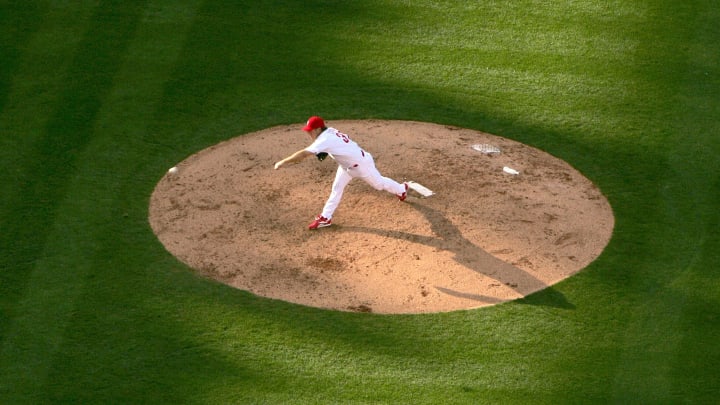The Beautiful Life of Rheal Cormier
By Kyle Koster

Rheal Paul Cormier was born on April 23, 1967 in Moncton, a port city in New Brunswick, Canada. He died on Monday at the age of 53 after a battle with pancreatic cancer. The durable lefthander appeared in 683 Major League games, starting 103 of them and joining 580 in progress. He was someone who came in unheralded from the bullpen to ever-so-briefly hold the fate of the game in his hands and depart, hopefully before anyone noticed he was out there. Such is existence for a middle reliever. The truest mark of greatness is to forget all the times they get out of jams and fail to remember the times they couldn't hold a lead.
He went 7-10 for the Montreal Expos in 1996 while posting a 4.17 ERA. But on the eve of his 29th birthday, he threw a complete game shutout against the St. Louis Cardinals. There were a fewer than 10,000 fans at Stade Olympique on that Monday night to see Cormier notch his first win for the Canadian franchise, which played its inaugural game the year after Cormier was born. It'd be the only shutout of his career.
His best season came in 2003 as a member of the Philadelphia Phillies at the age of 36. Cormier dazzled and confounded to a perfect 8-0 record and an ERA of 1.70, some 2.5 runs lower than his career average and an ERA+ more than double his output in most other summers. He'd never pitched like that before. He never pitched like that again.
After playing for his country in the 1988 Seoul Olympics, Cormier returned for a second run at gold 20 years later, at the age of 41, getting his arm back in shape by dropping into a men's senior league.
Dan Plesac called him one of the best teammates he'd ever had. Cormier was rumored to give good friend Jim Thome a ride back to the hotel after they were on opposite ends of a beanball. He was thoughtful and professional and steady.
His name is written inside Fenway Park's Green Monster, where he pitched as both friend and foe, above the inscription La vie est belle.
Found this eight years ago inside the Green Monster at Fenway. “Life is beautiful...” pic.twitter.com/T0AdLaP51S
— Matt Gelb (@MattGelb) March 8, 2021
Cormier's life was too short but undeniably beautiful. It is beautiful that a working-class French-Canadian kid lived his dream. The Majors may as well be the moon and getting there is an unfathomable possibility. But Cormier got there. And he stayed there. He earned respect there.
The best game of his life came for his local team, in front of fans who cheered him on in their shared native tongue. He enjoyed the thrill of knowing he was one of the most productive pitchers in baseball, finding an unexpected white-hot flame to light a playing path coming to its conclusion. He shared a dugout on an otherwise nondescript recreation field with accountants and mechanics, slapping hands with them after striking out the side in order without facing anyone with varsity experience.
Cormier's name will never be in bold within the history books. It will go largely unnoticed and unconsidered. Such is the natural order and the limitations of human bandwith. But he was able to write it, both physically and metaphorically, next to the greats. He did unbelievable things that went noticed, and only appreciated when forced through the prism of tragedy.
He could have written anything on that wall. He wrote that life is beautiful. He was right.